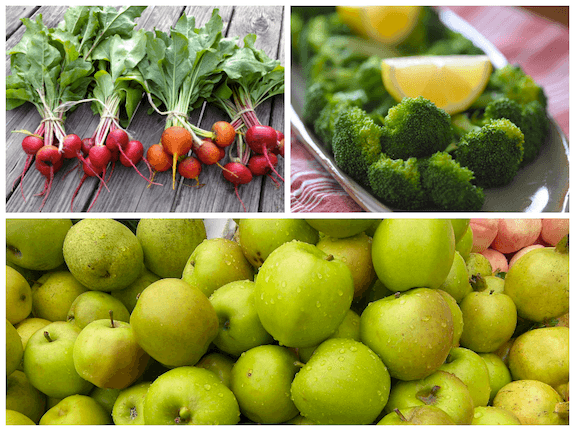Feeling a little fall sluggishness that a little fall detox could help with? Well, before you go speed-dialing a 3-day cleanse, you might want to consider opening your fridge first.
You can ditch the bloat and the sluggishness by eating fiber-filled foods that support your liver—and are probably already in your fridge or on your kitchen counter. (A ton of water doesn’t hurt either.)
When you think of your body’s detox capacities as a bucket that must be emptied—after, say, a summer of indulgence—remember there are two ways to stop the bucket from overflowing: dump the bucket (i.e., eat detox foods) or stop the flow of gunk in and take out garbage foods like processed foods, sugar, and alcohol.
Here are the five foods to help you detox this fall—and many of them are probably already in your kitchen (or on your shopping list).
1. Brassica Veggies
Many foods that are considered detoxing support the liver—meaning they aid in getting garbage transformed and packaged for elimination through the GI tract. Brussels sprouts, cabbage, broccoli, and kale are detox powerhouses. They’re full of fiber and contain enzymes that help metabolize toxins and excess hormones.
Many foods that are considered detoxing support the liver—meaning they aid in getting garbage transformed and packaged for elimination through the GI tract. Brussels sprouts, cabbage, broccoli, and kale are detox powerhouses. They’re full of fiber and contain enzymes that help metabolize toxins and excess hormones.
2. Beets
These root veggies contain betacyanin, which is a great liver detox booster. It’s one of my favorite carbohydrate sources for those avoiding processed starches and even Paleos who skip grains.
These root veggies contain betacyanin, which is a great liver detox booster. It’s one of my favorite carbohydrate sources for those avoiding processed starches and even Paleos who skip grains.
3. Protein
Most detox plans recommend a vegan diet. But sulfur-containing amino acids found in animal protein are the fuel your phase-two liver detoxification runs on.
Most detox plans recommend a vegan diet. But sulfur-containing amino acids found in animal protein are the fuel your phase-two liver detoxification runs on.
You can eat any kind of meat, but it’s got to be quality stuff. If it’s garbage protein then we’ll just be bringing in more stuff in to be detoxed. So think free range, antibiotic- and hormone-free chicken, grass fed beef, and low toxicity or wild fish.
4. Flaxseeds
They’re a great source of fiber and help scoot out stuff your liver has already detoxed, especially metabolized hormones like estrogen. But. flax goes rancid very easily so either grind the seeds just prior to use or soak them in just enough water to cover them over night. They will be soft and slippery by morning and easily go into a protein shake or taken like a shot.
They’re a great source of fiber and help scoot out stuff your liver has already detoxed, especially metabolized hormones like estrogen. But. flax goes rancid very easily so either grind the seeds just prior to use or soak them in just enough water to cover them over night. They will be soft and slippery by morning and easily go into a protein shake or taken like a shot.
5. Apples
The pectin in apples are great for ushering out detoxed hormones and other junk. They’re also one of the highest water and fiber to sugar ratios of any fruit, making them a great high fiber, lower sugar fruit choice. Win, win.
The pectin in apples are great for ushering out detoxed hormones and other junk. They’re also one of the highest water and fiber to sugar ratios of any fruit, making them a great high fiber, lower sugar fruit choice. Win, win.
~Thanks to Molly Gallagher and Dr. Kalanick


















